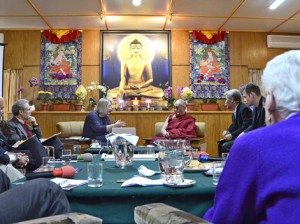Scheduled just before its bigger cousin, the Dharamshala International Film Festival (DIFF), the modest Tibet Film Festival was held at the Tibetan Institute of Performing Arts (TIPA) in Dharamshala on October, 19 – 20. Though the DIFF, started by Tenzing Sonam and Ritu Sarin (directors of “Dreaming Lhasa”), is revolutionary in its own right bringing international films to Dharamshala, the Tibet Film Festival is special as it screens films only made by Tibetans, from within Tibet and in exile.
In its fifth edition the festival, which is held simultaneously in Zurich and Dharamshala, is dedicated to Dhondhup Wangchen, the documentary filmmaker who was imprisoned in China for six years in 2009 shortly after completing the shooting of his film “Leaving Fear Behind”.
Right from the start the festival created a buzz, with its controversial poster depicting a Tibetan girl’s chuba flying up Marilyn Monroe style. There were lively discussions on social media whether this depicted Tibetan culture, was a misappropriation of a western icon, is good fun, or just plain sexist, and raised questions of what constitutes “Tibetan-ness” more than fifty years after the Chinese take-over.
Unlike film festivals where stars and glamour are the highlight, the festival opened with a tender message read out by Dhondhup’s teenage son, Tenzin Norbu, to his father on his 39th birthday.
The festival included a short film competition, a discussion on film appreciation, a panel discussion on the status of Tibetan filmmaking, and performances by JJI Exile Brothers and the Dharamshala Dance Troupe.
Filmmaker Tsering Tashi Gyalthang based in Vietnam was invited to speak on film appreciation. Voicing a concern that Tibetan filmmakers and artists may feel pressured to adopt political themes, Gyalthang said filmmakers should make films “not necessarily political or about freedom but about who we are, our identity, our belief system.”
Besides the films of the short film competition, the first day featured ‘Summer Pasture’ by Lynn True, Nelson Walker and Tsering Perlo (USA), ‘Khayr’ by Kalsang Rinchen (India), ‘Crossings’ by Lobsang Choephel (USA), ‘Scent of Juniper’ by Tashi Wangchuk (USA), ‘The Incomplete Story’ by Taklha (India) and ‘Shenphenn: Journey of a Dream’ by Shenphenn Khymsar (Canada).
In addition to the films for the short film competition, the first day featured “Summer Pasture” by Lynn True, Nelson Walker and Tsering Perlo (USA), “Khayr” by Kalsang Rinchen (India), “Crossings” by Lobsang Choephel (USA), “Scent of Juniper” by Tashi Wangchuk (USA), “The Incomplete Story” by Taklha (India) and “Shenphenn: Journey of a Dream” by Shenphenn Khymsar (Canada).
Two films that stood out on the first day were “Khayr” and “The Incomplete Story”. Based on a short story by Bhuchung D Sonam, “Khayr” revolves around the friendship between a Tibetan boy and a Kashmiri militant. Its strong storyline and decent acting made up for the conventional narrative style. The surprise of the day was the five-minute “The Incomplete Story” which played with non-linearity, time and the notion of reality, and displayed a wonderful control and understanding of the film medium by the director.
The second day opened with “Who killed Johnny” by actress Yangzom Brauen (Switzerland), followed by the documentary “Stranger in my Native Land” by pioneering filmmakers in exile Tenzing Sonam and Ritu Sarin (India). The film is an honest and touching account of Tenzing’s journey back to Tibet in 1995. “Amdo has long lost its culture, its language. Most Tibetans who live here don’t speak Tibetan, they speak a Chinese dialect. So going there to my father’s village was really depressing”, said Tenzing. Tenzing has already written the script for their second fiction film and they hope to shoot it next year.
“We Corner People” by Kesang Tsetan (Nepal), was an engaging documentary exploring life in a remote village of Nepal, structured around the building of a bridge over a nearby turbulent river.
The winners of the short film competition were: First Prize ($500) – “sBett” by Lobsang Reichlin (Switzerland), Second Prize ($300) – “TCV and I” by Palden Khar (India), Third Prize ($200) and Audience Award ($200) – “The Pond” by Tenzin Phuljung (India).
The closing film was Pema Tseden’s first feature “The Silent Holy Stones”. Internationally acclaimed filmmaker Pema Tseden, an alumni of the Beijing Film Academy, is the trailblazer of Tibetan cinema emerging from within Tibet. His seemingly simple human stories depict Tibetan identity and cultural change beautifully, without being overtly political. The classically composed shots of “The Silent Holy Stones” unfold the story of a young monk obsessed with a television series.




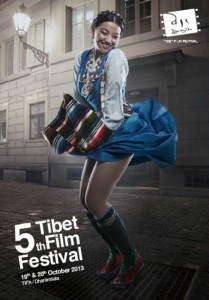
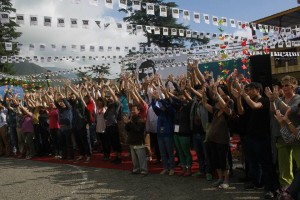
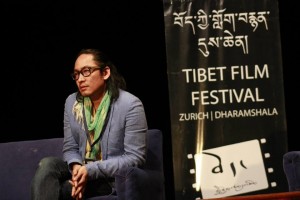
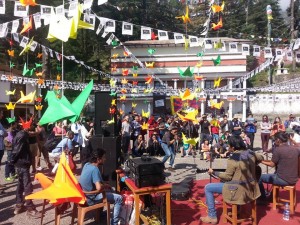

 Print
Print Email
Email